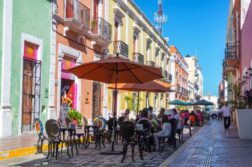Cecilia Rodriguez Senior Contributor FORBES
Restaurants, bars and cafes in France are ready to reopen from June 9. Spain opened its borders on Monday to all vaccinated travelers, as has Greece, while the rest of Europe prepares to receive tourists cautiously as soon as the first day of July.
Although the continent is still far from eradicating the Covid-19 virus, vaccination campaigns are rolling out fast, testing is easily available and the European Commission has gone live with the technical system at the E.U. level “to allow verifying certificates (Covid-passports) in a secure and privacy-friendly way,” a press release announced.
The issue of a Green Pass common to all the countries of the bloc will permit free border crossing starting July 1.
“The EU Digital Covid Certificate will facilitate safe free movement of citizens in the EU during the Covid-19 pandemic,” explains the European Commission, adding that “countries can start issuing and using it already and it will become available in all EU Member States as of 1 July 2021.”
Bulgaria, the Czech Republic, Denmark, Germany, Greece, Croatia and Poland started issuing the first E.U. Covid-19 travel certificates, while most of the other countries will join in coming days.
Some of the most popular destinations such as Greece and Italy have already seen increases in bookings while Spain, which started opening to visitors this week, hopes to recover up to 70% of its pre-pandemic tourism levels.
This is the situation related to entry rules at Europe’s hotspots:
France happy to open

The world’s top tourist destination and one that has imposed some of the most stringent Covid-19 restrictions since 2020 allows its cafes and restaurants operating 100% of their outside space and 50 percent of their indoor space with tables still limited to six people and bar service banned, The Local reports.
“In addition to these restrictions, owners are now required to collect customer details so that they can be traced in the case of a Covid outbreak. Most have taken up the government’s offer of a QR code that can be scanned with a smartphone to collect details from each customer, but plenty also have a pen-and-paper option for people who prefer the old-fashioned way,” the paper writes.
The country has produced a color coded map establishing protocols of entry from foreign countries “according to the health situation in third countries and the vaccination of travelers” that will start operating from June 9.
The lists of countries which are likely to be adapted according to changes in their epidemic situation are:
- “Green” countries: European area, Australia, South Korea, Israel, Japan, Lebanon, New Zealand and Singapore.
- «Orange» countries: All countries except “green” and “red” countries.
- “Red” countries: South Africa, Argentina, Bahrain, Bangladesh, Bolivia, Brazil, Chile, Colombia, Costa Rica, India, Nepal, Pakistan, Sri Lanka, Suriname, Turkey and Uruguay.
For «orange» zones, which include North America, Great Britain and most of Asia and Africa, “even vaccinated travelers will have to produce a negative Covid-19 test taken within the last 72 hours (or 48 hours for a negative antigen test). But they will no longer need to quarantine,” according to France 24.
Mask-wearing remains mandatory indoors and outdoors but curfew rules will be lifted on June 30.
Spain

“Spain reopens to global tourists, provided they can prove that have been vaccinated,” is the Spanish newspaper El Pais’s headline.
On Monday, the country dropped the requirement for E.U. arrivals to produce a recent negative PCR test and antigen tests are now accepted instead of PCRs for travelers from countries on the list of risk zones such as France and Germany
“Anyone who has been vaccinated can now enter the country, irrespective of their point of origin,” reports France 24.
They must show proof of having received the full doses of a Covid-19 vaccine approved by either the World Health Organization (WHO) or the European Medicines Agency (EMA), more than 14 days prior to arrival, or that they overcame a Covid-19 infection in the past six months.
Everyone will still have to fill out the travel form available on Spain Travel Health (SpTH). “At ports and airports there will be two control points,” according to the government statement. “Whoever comes from countries or zones not included on the list of risk zones will have access to a quick control with the QR code obtained from SpTH. And once the EU Digital Covid certificate goes into effect, whoever has this document will also have access to this quick control.”
Minors will be permitted to enter Spanish territory when accompanying people who have been fully vaccinated. Travelers who until now were permitted to enter on presentation of a negative coronavirus test can now opt for a cheaper antigen test rather than the more expensive PCR.”
Brazil, India and South Africa remain on Spain’s red list.
As in most of the continent, masks are mandatory, including outdoors, except on beaches as long as people keep a distance of at least 1.5 meters from each other.

Greece
Hoping to reach about half its pre-pandemic tourism revenues, the Greek government has been among the pioneers in issuing a green pass and officially launched its tourist season last month to lure vacationers emerging from lockdowns.
Marking the season, Greece is welcoming visitors from the E.U. as well as the U.K., U.S., Serbia and Israel, allowing entry with no quarantine requirement if they have been fully vaccinated or can show negative Covid-19 tests.
Residents from China, Thailand, Russia and Saudi Arabia are also welcome.
All visitors must complete a form and produce proof of vaccination or a PCR test of less than 72 hours, or show a certificate of post-infection immunity.
The Greek government has prolonged the restrictions on air travel until 6 a.m. on Monday, June 14, for countries that are not 0n the list, SchengenVisaInfo.com reports.
Masks remain mandatory both indoors and outdoors while night clubs and indoor cultural venues will stay shut, while the maximum number of people allowed per table in restaurants is six, except from some of the isles.
Italy

The green pass or ‘certificato verde’ for travel and large events is already operating in paper format in Italy and is expected to be available in digital format by the end of the month.
Last month, the country stopped its coronavirus quarantine requirement for U.K. travelers while new arrivals from the E.U., Britain and Israel can enter with a negative Covid-19 test less than 48 hours old and complete a health form to be exempt from quarantine.
The government has extended trials of Covid-tested flights to airports in Venice and Naples, following Milan and Rome, as well as to authorized routes from Canada, Japan, the United Arab Emirates and the United States.
“Italy’s Lazio region of Rome has launched a €10 million tourism campaign in order to attract tourists to stay longer by subsidizing the accommodation cost in the capital and other surrounding areas,” Schengen Visa Info said.
The special holiday package includes one extra free night for those booking a holiday of at least three consecutive nights in the region of Lazio and two extra free nights for those who book five nights.
Travelers from Australia, South Korea, Rwanda, Thailand, Canada and the U.S. must show a negative test, enter quarantine for 10 days and then take another test.
Brazil, India, Bangladesh and Sri Lanka are still on Italy’s red list until June 21.
Masks are still mandatory, although from July people may be allowed to take them off when outside.
No more than four people per table are allowed in bars and restaurants.

Portugal
Portugal is welcoming travelers from most European countries since May.
“People from European Union countries with a Covid-19 incidence rate of less than 500 cases per 100,000 inhabitants will be able to make ‘all types of travel to Portugal, including non-essential travel,” the government announcement reads.
Expected to sign up to the E.U. travel pass on July 1, Portugal has the lowest 14-day incidence rate in the EU/EEA with 49.5 cases per 100,000 population according to the European Centre for Disease Prevention and Control (ECDC).
Travel restrictions remain in place for eight countries, including five E.U. member states: Cyprus, Croatia, Lithuania, the Netherlands and Sweden, as well as South Africa, Brazil and India.
The Council of Ministers announced that as of June 14, restaurants, cafes and pastry shops will open until midnight. Attendance to shows can occur up to 50% of the venue-capacity limit, while training and amateur sports venues will have a 33% capacity limit.
However, bars and nightclubs will not reopen yet.
Portugal’s popular Algarve coast, which appears among the safest areas for traveling in Europe, has seen bookings picking up since the country reopened to European tourists last month.
All arrivals from E.U. countries, the Schengen area and the U.K. need a negative PCR test less than 72 hours old to enter. The same holds for visitors from Australia, South Korea, Israel, New Zealand, Rwanda, Singapore, Thailand and China.
Hundreds of travelers from the U.K. who had traveled to Portugal after the government lifted restrictions were scrambling this week to get out when, after only 17 days, the British government decided to switch the popular holiday destination from its travel green list to amber, which means that people have to quarantine at home or in the place they are staying for 10 days and take a Covid-19 test on or before day 2 and on or after day 8.
Everyone else needs a compelling reason to enter Portugal.
Arrivals from South Africa, Brazil and India must quarantine on arrival.
Every traveler over the age of two must present a negative PCR test less than 72 hours old.
Social distancing and mask-wearing are mandatory and special rules are in place for beaches and swimming pool areas, with a distance of three meters between parasols.

The Netherlands
The Netherlands, which has one of the highest number of coronavirus cases detected so far, is opening with utmost caution.
On June 1, the Dutch authorities decided to lift the flight ban imposed on Covid-19 high-risk countries including India, South Africa and some countries from South and Central America, but kept a 10-day quarantine upon arrival in the Netherlands.
The quarantine period is expected to be shortened if a negative test result is provided on the fifth day of self-isolation, SchengenVisaInfo.com reports.
Anyone who fails to follow the quarantine rules will be issued a fine of €435.
The following safe countries (countries with a low risk of Covid-19) are allowed to enter without testing or self-isolation requirements:
- Outside the E.U./Schengen Area: Australia, New Zealand, Rwanda, Singapore, South Korea, Thailand, China and Israel.
- E.U./Schengen Area countries: Iceland, Portugal, Finland, Malta, Ireland, the Balearic Islands, the Canary Islands, Greece’s North Aegean Region and the Ionian Islands, Norway (excluding Oslo and Agder), Portugal and Romania.
- Countries within the Kingdom of the Netherlands:Curaçao, Aruba Bonaire, St Maarten, Saba, and St Eustatius.
Due to the travel restrictions, the Netherland’s travel and tourism industry has suffered greatly. As a result, the E.U. Commission approved a scheme of €400 million to support companies that provide package travel and linked travel arrangements in the country.




